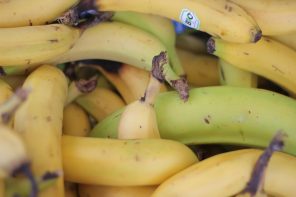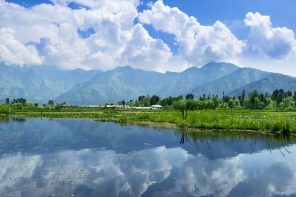Where cultures mingle, controversy is never far away. Eving, a district in the north of Dortmund, was once a home to mineworkers. Today, integration is its biggest issue. When a Muslim community wanted to extend its mosque with a minaret in 2009, tensions arose.
By Philipp Anft, Noelle O’Brien-Coker, Samuel Acker, Jan-Ole Niermann & Philipp Glitz

For Ali Kisa, the Minaret represents his community.
Slowly, Mehmet Ali Kisa pours hot water into his tea cup. The noise of the TV and the group of elderly men, sitting in front of it chattering in Turkish, blends with the sound of Ali stirring the steaming Jasmin tea. The 64-year old takes a sip from the cup and wipes his moustache. “This is our home”, he says and smiles.
“This” means the Selimiye Mosque and Muslim Community Centre in Eving, a northern district of Dortmund. The community centre was founded in the late 1980’s, as more and more Muslim Turks came to the city to work there. In 2009, the Mosque became the first one in Dortmund to sport a Minaret. 82 feet high, painted in blue and white, it gives the building a distinct oriental look. “This is a sign for successful integration”, says Adam Sönmez, chairman of the community. “People can relate to the minaret. They can say ‘We are different, but yet we are still part of the German society and accepted”. In the background, the Imam calls to prayer.
Gardening in the working class district

Heinrich Jordan enjoys working in his garden
Only a few steps across the street, Heinrich Jordan is busy raking his garden soil. It’s April and the weather is perfect for a day outside. Heinrich takes a refreshing sip of his chilled beer. He is the chairman of the German garden community “Gut Glück” (Good luck) in Eving. “We’ve made really good experiences with most of the mosque’s visitors,” Heinrich says.
“Gut Glück” provides 46 little gardens, most of which are rented by Germans. Garden communities are typical of German culture, which makes it even more interesting to see how the gardeners get along with their foreign neighbours. “But one thing that really annoyed us was that some visitors completely blocked our parking spaces. We decided to install a barrier post, which only members of the garden community can remove.
Fortunately, since then we haven’t had any problems any more”, Heinrich says. His attitude towards foreigners is typical of many of Eving’s German Citizens: a peculiar mixture of tolerance and a hint of suspicion. A traditional Muslim mosque and a typical German garden community next door: This seemingly contrastive picture is the result of Eving’s specific history: after WWII, the working-class district attracted many immigrants, especially from Turkey. Its prominent coal mine “Zeche Minister Stein” offered enough work for everyone.
Today Eving has about 35,000 inhabitants, almost a fifth of which are foreigners. But the economic situation has changed dramatically since the coal mine was shut down. With 15.4%, the unemployment rate is above Dortmund’s overall average. A rather heavy discussion surrounding the construction of Eving’s first minaret marks the height of the tensions that developed between the different cultures in Eving. As the Muslim community went public with their plans to build the religious tower in 2008, some of Eving’s German inhabitants felt extremely offended and openly showed their resentment towards the Muslims. Detlef Münch, an activist from a citizen initiative, even set up a petition against the building (see video podcast below).
„They didn’t like a Turk moving in“
The major political parties in Dortmund’s city council were split: the centre-right party CDU (Christian Democrats) was also against the construction. But the Selimiye Community came to an agreement with the centre-left SPD (Social Democrats) and the centre-left “Die Grünen” (Green Party), which altogether had the majority of votes in the council. Eventually, the minaret was built and opened up in August 2009 – to the delight of the Muslim citizens. Yet, the discussions und struggles leave a bitter taste of mistrust. Obviously, there are still tensions between Eving’s cultures.

Ali Kisa at his kiosk in the Selimiye Mosque
Ali Kisa feels the same tensions between German and Turkish people living in Eving. Ali came to Dortmund in the 1981 and felt like the locals were not yet ready for dealing with immigrants. “When I moved to my first apartment, I could sense my neighbours eying me. They did not like a Turk moving in”, he remembers. “That has changed today, but only to some extent. Some people still pass the mosque and murmur some insults.”
Like many of his compatriots, he worked in various coal mines near Dortmund. When the mines where shut down, he worked as a technical assistant for a telephone company. Today, Ali has retired and spends most of his days in the Community centre, selling tea and sweets from his small kiosk. “I’ve been living in Eving for 30 years, so it’s definitely my second home. And the community centre is the second home at my second home”
For Heinrich Jordan, this also applies to his neat garden. He spends almost all day there, from breakfast time until late evening at ten. Heinrich used to work as a businessman and nursery nurse, but now he has already retired, which gives him the time he needs to take care of his plants. Despite the debates that come up once in while, the gardener is very fond of his home district: “For me, Eving is a very beautiful and green part of Dortmund.”
Will understanding prevail?
Indeed, Eving provides a colourful, multicultural atmosphere. German, Turkish, Russian and Arabian stores stand side by side in the districts shopping venues. Yet it appears that Eving’s citizens of different cultural backgrounds rather live next to each other than with each other. There are only few multicultural institutions (see audio podcast below); most groups also spatially seem to stick to themselves. In 2014 the Muslim community will try to receive permission for a muezzin, a man who calls Muslims to prayer from the top of the minaret. Whether the former mining district will be able to produce intercultural understanding instead of coal might be tested then.




